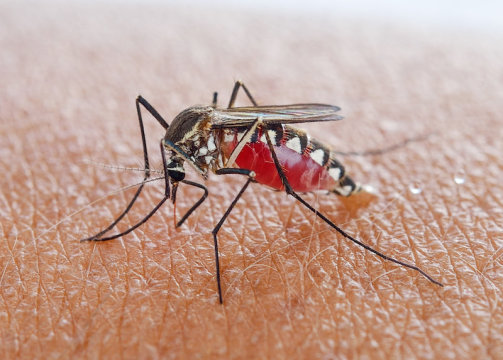[ad_1]
A discovery by a Washington State University-led research team has the potential to inhibit the spread of West Nile virus as well as Zika and dengue viruses.
In a study published today in the journal Cell Reports, researchers demonstrated that mammalian insulin activated an antiviral immunity pathway in mosquitoes, increasing the insects’ ability to suppress the viruses.
Mosquito bites are the most common way humans are infected with flaviviruses, a virus family that includes West Nile, dengue and Zika. In humans, both West Nile and dengue can result in severe illness, even death. Zika has been linked to birth defects when pregnant women are infected.
“It’s really important that we have some sort of protection against these diseases because currently, we don’t have any treatments. If we’re able to stop the infection at the level of the mosquito, then humans wouldn’t get the virus,” said Laura Ahlers, the study’s lead author and a recent Ph.D. graduate from WSU. Ahlers is now a post-doctoral fellow with the National Institutes of Health in Bethesda, Maryland.
Working first with fruit flies, which have similar immune responses to mosquitoes, Ahlers and her colleagues identified an insulin-like receptor in the insects that, when activated, inhibits the replication of the West Nile virus in the flies. The researchers then elicited this same response in mosquitoes by feeding them blood containing elevated insulin. Subsequent tests showed activating this receptor was also effective in suppressing dengue and Zika in insect cells.
While it was already known that insulin boosts immune responses in mosquitoes, this is the first time insulin’s connection to a particular immune response pathway, called JAK/STAT, has been identified. It is a significant step toward the long-term goal of creating an intervention, said Alan Goodman, WSU assistant professor and the corresponding author on the paper.
“If we can activate this arm of immunity through the insulin receptor in the mosquito, we can reduce the overall viral load in the mosquito population,” Goodman said. “If the mosquitoes are carrying less virus when they bite you, they will transmit less of the virus, and there’s a better chance you won’t acquire the disease.”
Story Source:
Materials provided by Washington State University. Original written by Sara Zaske. Note: Content may be edited for style and length.
[ad_2]















